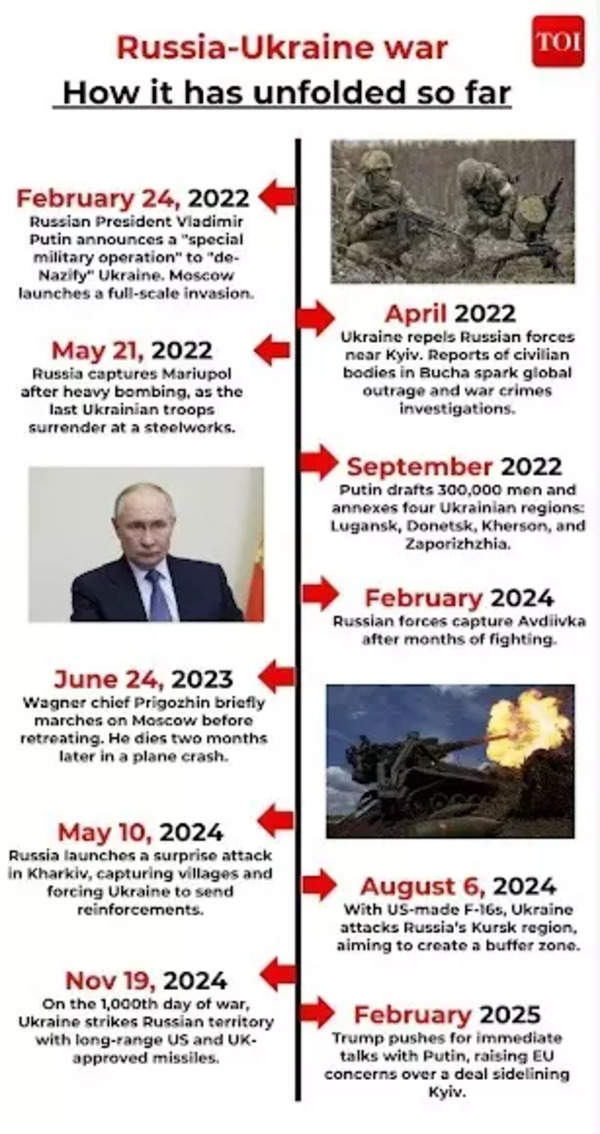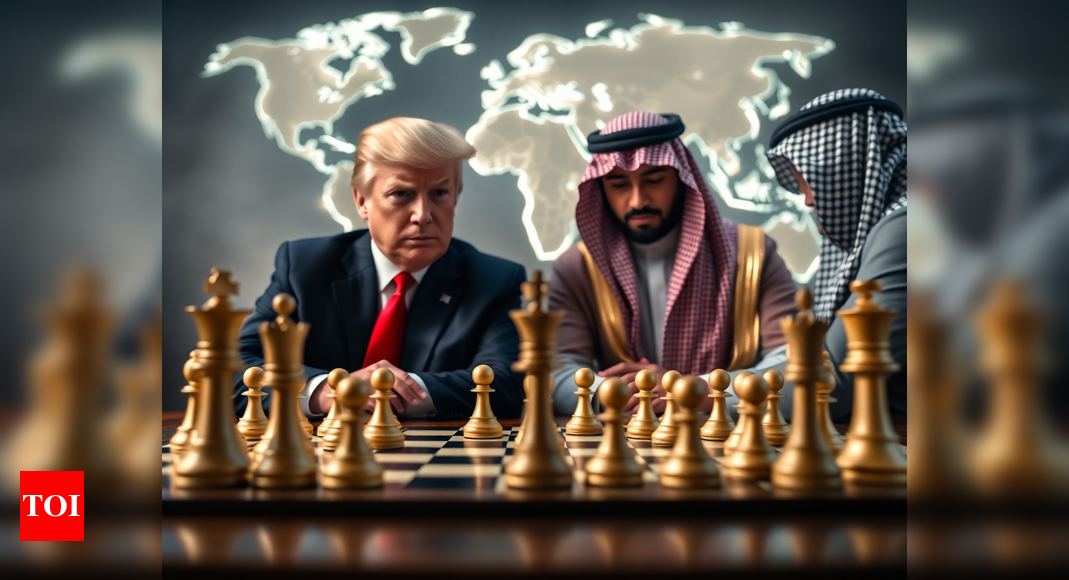Saudi Arabia is taking centerstage in global diplomacy as it hosts a historic meeting between senior US and Russian officials on Tuesday. This marks the first direct, high-level talks between the two powers since Russia’s full-scale invasion of Ukraine nearly three years ago.
The meeting is expected to lay the groundwork for a potential peace deal, with discussions on restoring US-Russia relations and preparing for a summit between US President Donald Trump and Russian President Vladimir Putin.
“It’s a big coup for Saudi,” Ali Shihabi, a Saudi government advisor, told AFP. “The two superpowers come to Riyadh to settle their disagreements. It’s quite prestigious and affirms the soft power of the kingdom.”
This meeting follows a whirlwind of diplomatic maneuvers, including a separate emergency summit in Paris on Monday where European leaders scrambled to coordinate their response to Trump’s approach. Ukraine, notably, has been left out of the initial US-Russia talks, raising fears that Washington and Moscow could strike a deal that Kyiv—and its European allies — will have to accept.

Russia-Ukraine war timeline
Why it matters
- Saudi Arabia’s role as host highlights a remarkable comeback for its de facto leader Crown Prince
Mohammed bin Salman from diplomatic isolation. - For Prince Mohammed, whom former President Joe Biden once labeled a “pariah” following the 2018 killing of Washington Post journalist
Jamal Khashoggi , hosting these talks serves to enhance his standing and reshape how he is perceived by the West. - Ahead of the summit, the Saudi daily newspaper Okaz characterized the occasion as the “world’s eye on Riyadh.”
- The talks also mark a major shift in US policy under Trump, who appears determined to end the war in Ukraine through direct negotiations with Moscow. This move has alarmed European leaders, who fear being sidelined and forced to accept a settlement that could leave Ukraine vulnerable to future Russian aggression.
- Moreover, Riyadh’s growing diplomatic weight extends beyond Ukraine. The kingdom is also set to host an Arab summit on Friday to discuss Trump’s controversial proposal for the US to take control of Gaza and permanently relocate its population—a move widely condemned across the Arab world.
The big picture
- Saudi’s hedging strategy: Saudi Arabia has successfully balanced its relationships with both Washington and Moscow throughout the Ukraine war:
- The kingdom has maintained close ties with Russia through OPEC+, coordinating oil production to stabilize global markets.
- Simultaneously, it has pledged hundreds of millions of dollars in humanitarian aid to Ukraine, hosting Ukrainian President
Volodymyr Zelenskyy multiple times since 2022. - In September 2022, Saudi Arabia played a key role in brokering a prisoner exchange between Russia and Ukraine, securing the release of foreign fighters, including Americans and Britons.
- This careful diplomacy has allowed Saudi Arabia to strengthen its position as a neutral mediator—a role that has now culminated in Riyadh becoming the venue for the most significant US-Russia talks in years.
Trump-Putin dynamic
Tuesday’s talks in Riyadh are widely seen as setting the stage for an eventual summit between Trump and Putin. Trump, who has long been skeptical of prolonged US involvement in Ukraine, has signaled his willingness to negotiate directly with Moscow to end the war.
However, this approach has alarmed European leaders and Ukraine, who fear that Trump may make concessions to Putin—such as allowing Russia to retain occupied Ukrainian territories—in exchange for a ceasefire.
Putin’s demands for a peace deal remain firm:
- Ukraine must withdraw its troops from Russian-occupied territories.
- Kyiv must abandon its Nato aspirations.
- Western sanctions on Russia must be lifted.
Ukraine has consistently rejected these conditions, viewing them as a form of surrender. Yet, with Trump now pushing for a deal, Kyiv risks being pressured into compromises it does not want to make.
Europe left out
- While the US and Russia meet in Riyadh, European leaders gathered in Paris on Monday in an emergency summit to strategize their response. The meeting, called by French President Emmanuel Macron, exposed deep divisions among European powers on how to handle Trump’s direct engagement with Putin.
- UK Prime Minister Keir Starmer floated the idea of sending European peacekeeping troops to Ukraine in the event of a ceasefire—a proposal swiftly rejected by German Chancellor Olaf Scholz as “highly inappropriate” and “premature.”
- Poland and other Eastern European countries, which have been among Ukraine’s strongest supporters, worry that Trump may cut a deal with Putin that weakens Nato’s security guarantees for the region.
- Danish Prime Minister Mette Frederiksen warned, “Russia is threatening all of Europe now. A rushed ceasefire could simply give Moscow time to mobilize for another war.”
- Meanwhile, Macron insisted that Europe must demand “strong and credible security guarantees” for Ukraine before any deal is finalized.
- The EU’s biggest fear? That Trump might decide to reduce or even withdraw US military commitments to Europe, leaving the continent more vulnerable to Russian aggression.
An eye on Gaza
Saudi Arabia’s diplomatic push is not just about Ukraine. On Friday, it will host a separate Arab summit to discuss Trump’s controversial proposal to place Gaza under US administration and permanently resettle its more than two million residents.
Trump’s idea—framed as a way to “bring peace to the Middle East” by transforming Gaza into a luxury tourism hub—has been met with outrage across the Arab world.
Saudi Arabia has made it clear that any plan for Gaza must align with Palestinian aspirations for statehood. However, Riyadh may seek to use its strengthened ties with Washington as leverage to shape the outcome of US policy in the region.
“By facilitating President Trump’s stated goal of ending the Ukraine war, Saudi Arabia is well-positioned to accumulate goodwill in Washington,” Hasan Alhasan, a senior fellow at the International Institute for Strategic Studies in Bahrain, told CNN. “This could help the kingdom influence US policy on Gaza and broader Middle East issues.”
What’s next?
- Zelenskyy’s visit to Saudi Arabia: Despite being excluded from Tuesday’s US-Russia talks, Ukrainian President Volodymyr Zelenskyy is expected to travel to Riyadh later this week for separate discussions with Saudi officials. His goal: to ensure that Ukraine has a voice in any future negotiations.
- Trump-Putin summit in the works: If Tuesday’s talks produce tangible progress, a face-to-face meeting between Trump and Putin could be scheduled soon—an event that would send shockwaves through global diplomacy.
- European response evolving: With Trump’s new approach to Ukraine negotiations taking shape, European leaders will have to decide whether to align with his strategy or push back against a potential settlement that does not include Kyiv.
- Saudi Arabia’s growing influence: Whether or not a Ukraine deal is reached, Saudi Arabia has already emerged as the biggest winner from these negotiations. Its ability to bring the US and Russia together—while simultaneously leading discussions on the future of Gaza—cements its status as a global diplomatic powerhouse.
- As Saudi commentator Ali Shihabi put it, “This meeting enhances Saudi soft power regionally and globally. It’s a moment of validation for Mohammed bin Salman’s vision of making the kingdom a key player in global affairs.”
- For Saudi Arabia, the road from diplomatic isolation to being a critical mediator between world powers is now complete.
(With inputs from agencies)


